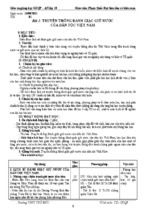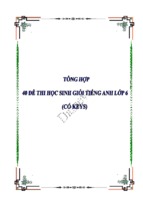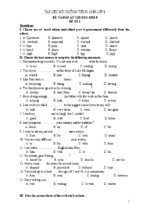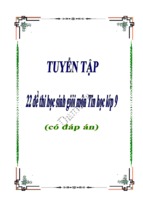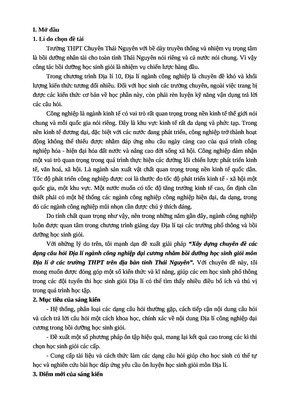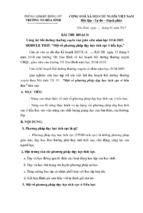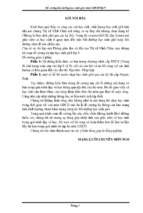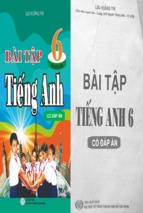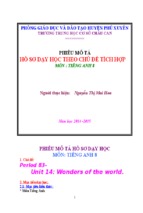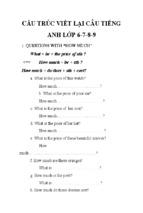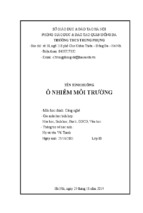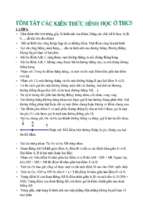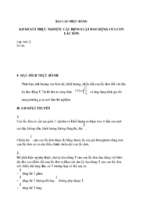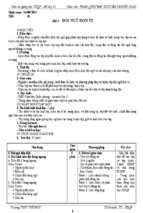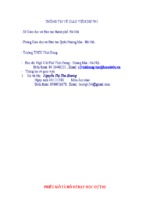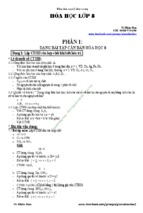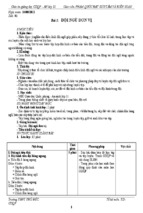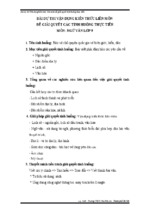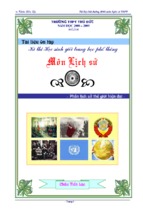¤n luyÖn HSG TiÕng Anh
Tenses ( Thêi cña ®éng tõ)
I/ Present Simple (HiÖn t¹i ®¬n)
1. Form
a. Kh¼ng ®Þnh
- I, you, we , they + V
- He, she , it
+ V+s / V+es
* Notes :
- C¸c ®éng tõ kÕt thóc lµ sh, ch, ss, o, x th× sang ng«i he, she , it thªm es
Eg : I wash He washes
I watch He watches
I go
He goes
I miss He misses
- Sau c¸c phô ©m k, p, t
s ®îc ®äc lµ /s/
- Sau c¸c trêng hîp cßn l¹i s ®îc ®äc lµ /z/
- Sau c¸c phô ©m sh, ch, ss, x ®u«i es ®îc ®äc lµ iz
- Nh÷ng ®éng tõ tËn cïng lµ phô ©m + y th× sang ng«i he, she, it y ®æi thµnh i tríc khi thªm es.
Eg : I study He studies
- Nh÷ng ®éng tõ tËn cïng lµ nguyªn ©m + y, biÕn ®æi b×nh thêng khi sang ng«i he, she, it.
Eg: I play, he plays ....
b. Phñ ®Þnh
- I, we, you, they
don't
+ V
- He, she , it
doesn't + V
c. Nghi vÊn
- Do
I / you/ we / they + V ?
- Does he/ she/ it
+V?
2. The use.
a. DiÔn t¶ møc ®é thêng xuyªn diÔn ra cña hµnh ®éng ë hiÖn t¹i. Thêng ®i víi always, usually,
often , sometimes, occasionally (thØnh tho¶ng), rarely, seldom (hiÕm khi), never,
everyday, every week....
once
twice / 2 times
3 times
a week/ a month/year ....
mét lÇn
hai lÇn
ba lÇn
mét tuÇn/ mét th¸ng/ mét n¨m ...
Eg : - He usually goes to the cinema.
- We clean our house everyday.
- Lan washes clothes twice a week.
b. DiÔn t¶ ®iÒu lu«n lu«n ®óng (sù thËt), hoÆc ®· ®óng trong mét kho¶ng thêi gian dµi.
Eg : - Some animals don't eat during winter. ( Mét vµi loµi ®éng vËt kh«ng ¨n vµo mïa ®«ng)
- We are Vietnamese. We speak Vietnamese.
- He works in a bank.
1.
2.
3.
4.
5
6.
7.
Exercise 1: Chia ®éng tõ trong ngoÆc:
They (go) on holiday every winter.
The days (be) longer in summer.
She often (talk) to herself.
Oak trees (grow) very slowly.
My dog (not eat) vegetables.
My brother (not like) animals.
Most people (not like) to visit a doctor.
8. In his job she usually (stand) .
9. My brother never (go) out in the evening.
10. He usually (work) with paints and brushes.
11. Do you know anyone who (speak) Italian?
12. At work he usually (sit) all day.
13. (you ever work) at the weekend?
Exercise 2: §äc ®o¹n v¨n sau, dïng tõ gîi ý ®Æt c©u hái vµ tr¶ lêi
Hans Huser is a ski-instructor. He is Swiss and he lives in Villars, a village in the mountains. In
summer he works in a sports shop and in winter he teaches skiing. He speaks 4 languages :
French, German, Italian and English. He is married and has two children. He plays football with
them in his free time. He's happy with his family.
1/ What / Hans Huser / do ?
2/ Where/ he / come / from ?
3/ he / live / city ?
4/ Where / he / work / summer ?
5/ What / do / winter ?
6/ How many languages / he / speak ?
7/ he / single ?
8/ How many children / he / have ?
9/ What / he / do / free time ?
10/ he / happy / family ?
1
¤n luyÖn HSG TiÕng Anh
Exercise 3: §äc ®o¹n v¨n sau, ®iÒn mét tõ thÝch hîp vµo chç trèng , sau ®ã dïng tõ gîi ý ®Æt
c©u hái vµ tr¶ lêi
Alan is a lorry -driver. He's 25 years ...... He works five days ......... week. Every morning he gets
up at 6 o'clock. He eats ......... enormous breakfast at 6.30. He ...... two cups of tea. Then he
kisses ..... wife. He leaves for work at 7.30. He ..... lunch in a transport cafe. He ...... home at 5
o'clock. In the evening he goes to the pub. He goes to ........ at 10.30.
1/ What / Alan / do ?
2/ How many days / week / he work ?
3/ What time / he get up ?
4/ he / drink coffee / morning ?
5/ What time he / leave / work ?
6/ Where / he / have lunch ?
7/ he / go cinema / evening ?
II/ Present Continuous (HiÖn t¹i tiÕp diÔn)
1. Form
a. Kh¼ng ®Þnh
I
am
You/ We/ They are + V-ing
He/ she/ it
is
b. Phñ ®Þnh
S + to be + not + V-ing
c. Nghi vÊn
To be + S + V-ing ?
*Notes :
- Nh÷ng ®éng tõ kÕt thóc lµ mét nguyªn ©m e, tríc khi thªm ing ta bá e.
Eg : have having
write writing
- Nh÷ng ®éng tõ 1 ©m tiÕt, 1 nguyªn ©m, kÕt thóc lµ mét phô ©m, tríc khi thªm ing ta gÊp ®«i phô
©m cuèi.
Eg : - sit sitting
- swim swimming
- C¸c ®éng tõ: die, lie, tie ... biÕn ®æi nh sau:
die dying, lie lying, tie tying
2. The use
a. DiÔn t¶ hµnh ®éng ®ang diÔn ra ë hiÖn t¹i, thêng ®i víi at the moment, at present, now ( b©y
giê , vµo lóc nµy )
Eg : - I'm cooking at the moment.
b. DiÔn t¶ hµnh ®éng t¬ng lai ®· ®îc s¾p xÕp s½n
He is meeting his brother at the station tonight.
(Anh ta sÏ ®ãn anh trai ë nhµ ga vµo tèi nay.)
c. Thêi hiÖn t¹i TD ®i víi always khi ta muèn phµn nµn vÒ mét hµnh ®éng lÆp ®i lÆp l¹i.
Eg : He's always losing his keys. (Anh ta cø lu«n ®¸nh mÊt ch×a khãa)
* Notes : Mét sè ®éng tõ kh«ng thêng dïng ë d¹ng tiÕp diÔn : be, understand, think (cho r»ng),
know, hear, love, like , stop , feel, smell, taste, sound ....
Exercise 1: Chia ®éng tõ trong ngoÆc:
1. What's that noise? Somebody (practise) the piano.
2. She (have) a shower at the moment.
3. Right now she (run) down a hill.
4. I'm looking at that woman, she (wear) a nice dress.
5. 'Where is Kate?' 'She (watch) TV in the living room.'
6. Don't bother me now. I ______________. (to work)
7. Take an umbrella. It ______________.(to rain)
8. - Where's Jim?
- He ______________ with friends.(to stay)
Exercise 2: §äc ®o¹n v¨n sau, dïng tõ gîi ý ®Æt c©u hái vµ tr¶ lêi
It's a Sunday morning. The sun is shining. Mary is watching TV in her room. Her father is reading
newspapers. Her mother is cooking in the kitchen. Mary has got a dog. It is playing with a cat in
the garden. It's a nice dog and Mary loves it very much.
1/ sun / shine ?
2/ What Mary / do / now ?
3/ father / read / newspapers ?
4/ What / mother / do ?
5/ What / dog / do ?
6/ Mary / love / dog ?
Exercise 3: §äc l¸ th sau dïng tõ gîi ý ®Æt c©u hái vµ tr¶ lêi
Dear Tom,
2
¤n luyÖn HSG TiÕng Anh
Now I'm in Rio. I'm staying in a big hotel. It's very beautiful but expensive. In the morning I
usually go to the beach. I sometimes go shopping in the afternoon. There are a lot of goods but I
don't have much money. In the evening I usually stay in my room and watch TV. At the moment,
I'm eating a delicious cake and writing this letter to you.
Tomorrow I'm going to the Trade Exhibition in the city centre. Well, let me stop now, Give my
love to everyone.
Love,
Susan
1. Where / Susan / stay ?
2. Where / she / go / morning ?
3. What / she / do / evening ?
4. What / she / do / at the moment ?
Exercise 4: Chia ®éng tõ trong ngoÆc ë ®óng thêi
1/ Hello, this is Dr Smith's office. Who (speak) ?
2/ Hurry up ! The train (come).
3/ It is a lovely day. The sun (shine) and the birds (sing).
4/ The Earth (go) round the Sun.
5/ Some animals (not eat) during the winter.
6/ - What Oanh (do) at the moment ?
- She (cook). She usually (cook) dinner for her family.
7/ In the evening he often (play) chess with his door neighbour.
8/ They (build) a new hospital in my town now.
9/ My father always (have) a rest after lunch.
10/ She's very lazy. She never (wash) the floor.
11/ Look at those boys ! They (hurry) home after school.
12/ Your mother usually (catch) the 8.10 bus ?
13/ Your sister (wait) for her friend at the station now?
14/ He usually (smile) at his wife when he (come) home.
15/ - Mrs Lan (use) the computer now ?
- Yes, she usually (use) it for her work.
16/ Minh sometimes (miss) his bus.
17/ My uncle often (watch) TV in the evening. But right now he (write) a letter .
18/- They (have) breakfast now ? - No, they (sleep)
19/ My father always (relax) at the weekend.
20/ You can't see Tom now. He (have) a bath.
21/ Tom can't have the newspaper now because his aunt (read) it.
22/ I'm busy at the moment. I (redecorate) the room.
23/ The kettle (boil) now. Shall I make the tea ?
24/ I don't want to go out now because it (rain) and I (not have) an umbrella.
III/ Simple Past (Qu¸ khø ®¬n)
1. Form
a. Kh¼ng ®Þnh
- §éng tõ cã qui t¾c : V-ed
Eg : - work worked
- clean cleaned
* Notes :
- Nh÷ng ®éng tõ mét ©m tiÕt, mét nguyªn ©m, kÕt thóc lµ mét phô ©m th× tríc khi thªm ed ta gÊp
®«i phô ©m cuèi.
Eg : -stop stopped
- drop dropped
- Nh÷ng ®éng tõ kÕt thóc lµ phô ©m + y , tríc khi thªm ed ta ®æi y thµnh i.
Eg : - study - studied
- Nh÷ng ®éng tõ kÕt thóc lµ nguyªn ©m + y, biÕn ®æi b×nh thêng.
Eg: - play - played
- Nh÷ng ®éng tõ kÕt thóc lµ e th× chØ thªm d :
Eg : - arrive arrived
*C¸ch ®äc ®u«i ed :
- §u«i ed ®îc ®äc lµ /id/ khi ®øng sau t vµ d :
Eg : wanted
needed
- §u«i ed ®îc ®äc lµ / t / khi ®øng sau k, p, sh, ch, ss, x
Eg : - stopped, washed, watched, missed, fixed, cooked ...
- §u«i ed ®îc ®äc lµ d sau c¸c trêng hîp cßn l¹i
- §éng tõ bÊt qui t¾c : - see saw
- get got
- do did
3
¤n luyÖn HSG TiÕng Anh
- have had
- be was / were
S + didn't + V
Did + S + V ?
b.Phñ ®Þnh :
c. Nghi vÊn :
2. The use
* Thêi qu¸ khø ®¬n diÔn t¶ hµnh ®éng x¶y ra trong qu¸ khø cã thêi ®iÓm râ rµng :
- yesterday
- last night
(tèi h«m qua )
week
( tuÇn tríc )
month
( th¸ng tríc )
year
( n¨m tríc )
- 2 ... days
ago (hai ... ngµy/ tuÇn .... tríc ®©y)
weeks
Eg: - We played football yesterday.
* §i víi when trong c©u hái vÒ hµnh ®éng trong qu¸ khø
Eg : - When did you see him ?
- I saw him this morning.
Exercise : Chia ®éng tõ trong ngoÆc ë ®óng thêi
1/ Minh (be) very tired when I (see) him yesterday.
2/ My father usually (work) 8 hours a day, but yesterday he (start) at 9.00 a.m and (finish) at 9.00
p.m.
3/ It usually (rain) a lot in summer but it (rain) a little last summer.
4/ -When John (leave) home ? -He (leave) 5 minutes ago.
5/ What you (do) last Sunday ?
- I (have) a holiday in New York.
Exercise : §äc ®o¹n v¨n sau, dïng tõ gîi ý ®Æt c©u hái vµ tr¶ lêi
Last year David went to Barcelona for his holiday. He went by air and stayed in a big hotel in the
city centre. He stayed there for 5 days. When he was there, he visited many beautiful places in
Barcelona. He took many photographs and bought a lot of souvenirs for his friends. He enjoyed
the holiday very much.
1/ When / David / go / Barcelona ?
2/ How long / stay ?
3/ How / he / go / Barcelona?
4/ Where / he / stay ?
5/ he / take / a lot / photographs ?
6/ What / he / buy ?
IV/ Past Continuous (Qu¸ khø tiÕp diÔn)
1. Form
a. Kh¼ng ®Þnh : S + was
+ V-ing
were
b. Phñ ®Þnh:
S + wasn't + V-ing
weren't
c. Nghi vÊn :
Was + S + V-ing ?
Were
2. The use
a. DiÔn t¶ hµnh ®éng ®ang diÔn ra t¹i mét thêi ®iÓm trong qu¸ khø. Thêng ®i víi at 2 o'clock /
at this time ...... yesterday (Vµo lóc 2 giê / thêi ®iÓm ...... nµy ngµy h«m qua )
Eg : - They were swimming at 8 a.m yesterday.
b. DiÔn t¶ hµnh ®éng ®ang diÔn ra trong qu¸ khø th× cã mét hµnh ®éng kh¸c (thêi qu¸ khø ®¬n)
x¶y tíi. Trong c¸c c©u nµy thêng cã While , As (Trong khi), When (Khi, trong khi)
Eg : - While I was going home, I saw an accident. (T«i thÊy tai n¹n trong khi ®ang vÒ nhµ)
As
When
- Mai was cooking when I came. (Khi t«i ®Õn Mai ®ang nÊu níng)
- When I came Mai was cooking.
c. §i víi all yesterday morning....
Eg : - They were dancing all yesterday morning. (Hä khiªu vò c¶ buæi s¸ng)
d. While ®îc sö dông trong c©u cã 2 hµnh ®éng ë thêi qu¸ khø tiÕp diÔn
Eg : While I was reading, my sister was listening to music.
( Trong khi t«i ®ang ®äc s¸ch th× chÞ t«i l¹i nghe nh¹c)
Exercise : Chia ®éng tõ trong ngoÆc ë ®óng thêi
1/ When I (arrive) at his house, he still (sleep) .
2/ The light (go) out while we (have) dinner.
3/ The last time I (see) him, he (wear) a grey suit.
4/ Just as I (leave) , a student (stop) me in the hall
5/ Nam (play) football when he (break) his leg.
6/ We (drink) a lot of beer at the party the day before yesterday.
7/ They (build) a new bridge when I was there 2 months ago.
4
¤n luyÖn HSG TiÕng Anh
8/ He (sit) in a cafe when I saw him.
9/ My company (make) a lot of profits 5 years ago.
10/ What you (do) when I phoned you on Monday ?
11/ While the two thieves (argue), someone (steal) their car.
12/ When he was a boy at school, Edison (ask) a lot of questions. The teacher (think) he was
stupid and she (send) him home. Edison's mother (teach) her son at home and he (begin) to carry
out a lot of experiments.
13/ - You (visit) the zoo yesterday ?
- Yes, I did. When I (go) there, I (see) our teacher.
14/ Who (invent) the radio ?
V/ Present Perfect (HiÖn t¹i hoµn thµnh)
1. Form
a. Kh¼ng ®Þnh : I / you / we / they + have
+ PII
He / she / it
+ has
b. Phñ ®Þnh :
S
+ haven't + PII
hasn't
c. Nghi vÊn :
Have
+ S
+ PII ?
Has
* PII : Ph©n tõ 2 (ph©n tõ qu¸ khø):
- Lµ d¹ng qu¸ khø ®¬n cña ®éng tõ cã qui t¾c.
- §éng tõ bÊt qui t¾c :
Eg : - go - went - gone
- do - did - done
2. The use
a. DiÔn t¶ hµnh ®éng võa míi x¶y ra, ®i víi just
Eg : - I've just cleaned my house. (T«i võa míi lau nhµ)
b. DiÔn t¶ hµnh ®éng ®· x¶y ra trong qu¸ khø nhng kh«ng nh¾c tíi thêi ®iÓm x¶y ra cña hµnh
®éng.
Eg : - I've lost my key. (T«i ®· bÞ mÊt ch×a khãa)
Kh¸c víi c©u I lost my key yesterday. (T«i ®· mÊt ch×a khãa h«m qua )
c.DiÔn t¶ hµnh ®éng ®· diÔn ra trong kho¶ng thêi gian vÉn cßn lµ hiÖn t¹i today, this week /
month...
Eg : - Have you seen Lan today ?
- No, I haven't.
- There have been 3 accidents here this month. (§· cã 3 tai n¹n ë ®©y vµo th¸ng nµy)
d. DiÔn t¶ hµnh ®éng ®· x¶y ra trong qu¸ khø nhng thêi ®iÓm kh«ng râ rµng, ®i víi already (®·
råi), recently, lately (gÇn ®©y), before (tríc kia).
Eg : - He's already done his homework.
- I've seen this film 3 times before. (T«i ®· 3 lÇn xem bé phim nµy tríc ®©y)
e. Dïng víi yet (cha, vÉn cha) trong c©u hái vµ c©u phñ ®Þnh.
Eg : - Have you met your new teacher yet ?
- No, we haven't met her yet.
f. DiÔn t¶ hµnh ®éng b¾t ®Çu trong qu¸ khø vµ kÐo dµi ®Õn hiÖn t¹i , ®i víi since, for, up to now ,
so far (cho tíi b©y giê),
- for + kho¶ng thêi gian
Eg : - My brother has been a doctor for ten years now. (Anh t«i ®· lµ b¸c sÜ ®îc 10 n¨m)
- since + mèc thêi gian
Eg : - We haven't met each other since we left school. (Chóng t«i ®· kh«ng gÆp nhau kÓ tõ khi
chóng t«i ra trêng )
-Up to now / So far we have visited 3 countries in the world. (Cho tíi b©y giê chóng t«i ®· th¨m 3
níc trªn thÕ giíi.)
g. Thêi hiÖn t¹i hoµn thµnh dïng víi ever (®· tõng), never (cha bao giê)
- ever ®i víi c©u hái vµ c©u kh¼ng ®Þnh
Eg : - Have you ever read this book ? ( CËu ®· tõng ®äc cuèn s¸ch nµy cha ?)
-No, I've never read it. (T«i cha bao giê ®äc nã)
- This is the most interesting film I've ever seen.( §©y lµ bé phim hay nhÊt mµ t«i ®· tõng xem)
h. Thêi hiÖn t¹i hoµn thµnh dïng víi
in the past 2/ 3 .... years/ months .... ( Trong 2/3 th¸ng/ n¨m qua) .
for
last
Eg : -There have been a lot of changes in our town in the last 2 years. (§· cã nhiÒu ®æi thay ë thÞ
trÊn chóng t«i trong 2 n¨m qua)
i. Thêi hiÖn t¹i hoµn thµnh dïng víi This is the first, second, third ...... time ( §©y lµ lÇn ®Çu tiªn,
lÇn thø hai ......)
Eg : - This is the first time I've tasted this food. (§©y lµ lÇn ®Çu tiªn t«i ®îc nÕm mãn ¨n nµy)
= I've never tasted this food before. (Tríc ®©y t«i cha bao giê ¨n mãn nµy)
k. Thêi hiÖn t¹i hoµn thµnh dïng víi
ages
for months
(®· l©u råi)
a long time
5
¤n luyÖn HSG TiÕng Anh
Eg : - I haven't seen my sister for ages. (§· l©u råi t«i kh«ng gÆp chÞ g¸i t«i)
= It's ages since I last saw my sister. (§· l©u råi kÓ tõ lÇn cuèi cïng t«i gÆp chÞ g¸i t«i)
Exercise : Chia ®éng tõ trong ngoÆc ë ®óng thêi
1/ My wife and I (be) there several times in the past.
2/ We (study) almost every lesson in this book so far.
3/ He (visit) his friends recently.
4/ - You (see) her today ?
- No, I haven't seen her yet.
5/ She (do) her homework already.
6/ They never (go) to the cinema in their life.
7/ Tom, I (not see) you for ages ! Where have you been ?
8/ He is the most kind-hearted man I ever (meet).
9/ There (be) 3 accidents on this street in the past 3 days.
10/ Is this the first time you (visit) our beautiful country ?
11/ Scientists (find) cures for many illnesses in the last 50 years.
12/ My uncle's health (improve) since he (leave) India.
13/ I (buy) a new shirt last week but I (not wear) it yet.
14/ I (not see ) Lan since we (leave) school.
15/ We just (move) to a new house but we (be) dissatisfied with it.
VI/ Present Perfect Continuous (HiÖn t¹i hoµn thµnh tiÕp diÔn)
1. Form
a. Kh¼ng ®Þnh : S
+
have/ has
+ been + V-ing
b. Phñ ®Þnh :
S
+
haven't / hasn't + been + V-ing
c. Nghi vÊn :
Have / Has +
S
+ been + V-ing ?
2. The use
a. Thêi hiÖn t¹i hoµn thµnh tiÕp diÔn diÔn t¶ hµnh ®éng b¾t ®Çu tõ trong qu¸ khø kÐo dµi liªn tôc
cho tíi hiÖn t¹i vµ võa chÊm døt ë ®ã .
Eg : - He's very tired now. He has been walking for 2 hours. (B©y giê anh Êy rÊt mÖt. Anh Êy ®· ®i
bé 2 tiÕng ®ång hå)
b. Thêi hiÖn t¹i hoµn thµnh tiÕp diÔn diÔn t¶ hµnh ®éng b¾t ®Çu tõ trong qu¸ khø kÐo dµi liªn tôc
cho tíi hiÖn t¹i vµ cßn diÔn ra trong t¬ng lai.
- I've been waiting for my friend since 2 o'clock. He hasn't arrived yet. (T«i ®· ®îi b¹n tõ lóc 2
giê. CËu Êy vÉn cha ®Õn)
c. Thêi hiÖn t¹i hoµn thµnh tiÕp diÔn dïng ví c©u hái How long, Since when
Eg : - How long have you been living here ? (Anh ®· sèng ë ®©y ®îc bao l©u råi ?)
- I've been living here for 12 years. = I started living here 12 years ago. (T«i b¾t ®Çu sèng ë
®©y 12 n¨m tríc ®©y.)
Exercise 1: Chia ®éng tõ trong ngoÆc ë ®óng thêi
1/ - How long you (learn) English ?
- I (learn) English for 5 years.
2/ - Where is Peter ? - He (be) in his room. He (sleep). He (sleep) since 2 o'clock.
3/ They (live) here for 20 years now.
4/ Look ! Her eyes are red and wet. She (cry).
5/ The boy is tired. He (run) for two hours.
6/ You look tired! Yes I (work) _____very hard.
7/ Where's the magazine I gave you? What (you do) _____________________ with it?
8/ We (have) ____ the same car for twelve years.
9/ This room was white. Now it is blue. He (paint) _____________________ it.
10/ This is the first time I (drive) _____________ a car. Thanks for lending me your car.
11/ These shoes are nice and clean. (you clean) _____________________ them?
12/ Sorry I'm late. (you wait) __________ long?
13/ Somebody (steal) _____________________ my keys. They are not on the table.
14/ Mary is still watching TV. She (watch) _____________________ TV all day.
15/ Look! Somebody (spill) ______________ wine on the floor.
VII/ Past Perfect (Qu¸ khø hoµn thµnh)
1. Form
a. Kh¼ng ®Þnh :
S
+ had
+ PII
b. Phñ ®Þnh :
S
+ hadn't + PII
c. Nghi vÊn :
Had + S
+ PII ?
2. The use
* Thêi qu¸ khø hoµn thµnh diÔn t¶ hµnh ®éng x¶y ra tríc mét hµnh ®éng qu¸ khø hoÆc mét thêi
®iÓm qu¸ khø kh¸c . Thêng ®i víi after, before, when, by the time (cho tíi khi), as soon as ( ngay
sau khi)
Eg : - After he had done his homework, he went to the cinema. ( Sau khi nã lµm xong bµi tËp, nã
®i xem phim.) = Before he went to the cinema, he had done his homework.
- When I got there, they had gone home. (Khi mµ t«i tíi ®ã, hä ®· vÒ nhµ råi.)
- When he had sung his song, he sat down. (Khi anh ta h¸t xong, anh ta ngåi xuèng)
- By the time we got to the station, the train had already left. ( Cho tíi khi chóng t«i tíi ga, tµu
®· ch¹y råi)
6
¤n luyÖn HSG TiÕng Anh
Exercise : Chia ®éng tõ trong ngoÆc ë ®óng thêi
1/ After her husband (get) home, she started to wash the clothes.
2/ When they reached France, they (visit) 13 countries.
3/ When she (arrive) at his house, she (find) that he (leave) a few minutes before.
4/ Before Mr Ron met me, he (do) nothing.
5/ Yesterday I was sorry that I (hurt) him.
6/ They (tell) her that they (not meet ) her before.
7/ When she (realise) her mistakes, she apologised.
8/ When I (meet) my cousin 2 weeks ago, he told me that he just (return) from the South.
VIII/ Thêi t¬ng lai ®¬n (will/ shall)
1. Form
a. Kh¼ng ®Þnh
S + will / shall + V
b. Phñ ®Þnh
S + won't / shan't + V
c. C©u hái
Will/ Shall + S + V ?
* Notes : - Will ®îc dïng víi tÊt c¶ c¸c ng«i. Shall thêng dïng víi ng«i I , we.
2. The use : - Thêi t¬ng lai ®¬n diÔn t¶ hµnh ®éng t¬ng lai ®¬n thuÇn.
Eg : - I'll do it tomorow. (I'll = I will) ( T«i sÏ lµm viÖc nµy vµo ngµy mai)
- He'll come here soon. (Ch¼ng mÊy chèc nã sÏ tíi ®©y)
- Our exam will be in two weeks. (Kú thi cña chóng t«i sÏ diÔn ra trong 2 tuÇn n÷a)
- They won't help you.
- Will you buy it ?
- Yes, I will/ No, I won't.
* Will cßn ®îc sö dông trong lêi yªu cÇu, lêi mêi
Eg : - Will you please get it for me ? (Yªu cÇu)
- Yes, certainly/ OK / of course.
- Will you come to my party ? (Lêi mêi)
* Will ®îc sö dông khi ®a ra lêi høa
Eg : - I will pay you tomorrow. ( T«i sÏ tr¶ cËu vµo ngµy mai)
* Shall ®îc sö dông trong lêi gîi ý
Eg : - Shall we go to the zoo this afternoon ? ( ChiÒu nay chóng ta ®i vên thó chø ?)
* Shall ®îc dïng trong lêi ®Ò nghÞ gióp ®ì
Eg : - Shall I do it for you ? ( §Ó t«i gióp cËu nhÐ)
IX/ Thêi t¬ng lai gÇn, t¬ng lai dù ®Þnh (Be going to)
1. Form
a. Kh¼ng ®Þnh
S + be going to + V
b. Phñ ®Þnh
S + be + not + going to + V
c. Nghi vÊn
Be + S + going to + V ?
- Are you going to work in France next month ?
- Yes, I am / No, I'm not.
2. The use
a. DiÔn t¶ hµnh ®éng t¬ng lai ®· lªn kÕ ho¹ch tõ tríc.
Eg : - He's going to get married next month.(Anh Êy sÏ cíi vî vµo th¸ng sau)
b.DiÔn t¶ hµnh ®éng s¾p x¶y ra trong t¬ng lai gÇn
.Eg : - Look at those clouds ! It's going to rain. (Nh×n nh÷ng ®¸m m©y k×a ! Trêi s¾p ma ®Êy !)
* So s¸nh Will vµ Be going to
- Be going to chØ hµnh ®éng t¬ng lai cã dù ®Þnh.
Eg : - I'm going to England for my holiday next week.
- Will chØ hµnh ®éng t¬ng lai bÊt chît, kh«ng ®îc dù tÝnh tõ tríc.
Eg : - Our teacher is ill. (ThÇy gi¸o bÞ èm ®Êy)
- Is he ? I'll visit him this afternoon (ThÕ µ ? ChiÒu nay tí sÏ th¨m thÇy. )
Exercise 1: Chia ®éng tõ trong ngoÆc ë ®óng thêi
1/ - Hai has just been taken to hospital with a broken leg.
- I'm sorry to hear that. I (visit) him.
2/ Look at those clouds. It (rain).
3/ What are you going to do with that dress ?
- I (shorten) it.
4/ I've hired a typerwriter and I (learn) to type.
5/ Listen to this ! I think this news (surprise) you.
6/ Tom, when you (get) married, this month or next month ?
7/ - What you (do) next week ? - I (visit) my grandparents.
Exercise for Revision : Chia ®éng tõ trong ngoÆc ë ®óng thêi
1/ Roy (come) from New York. He (live) in California now. He (study) marketing. He has earned a
lot of money and just (buy) a car. He (drive) his car to his friend in the countryside yesterday.
While he (drive) there, he (see) a train accident....
2/ Mr Baker (work) as an engineer. He (be) an engineer since 1985. He (have) 2 children. They
(study) abroad now.
3/ I never (meet) anyone famous yet. Have you ?
- Yes, I (have). I (meet) Elton John in New York in 1988 and we (talk) to each other a lot.
7
¤n luyÖn HSG TiÕng Anh
4/ In the evening I often (play) chess with my door neighbour. I (play) chess with him ever since I
(come) to live here ten years ago. He (be) here all his life. He (inherit) the house from his father,
another great chess player.
5/ Alice (be) 18 years old and she (come) from England. She is now in Hanoi and (study)
Vietnamese. She (arrive) in Hanoi in January, so she (be) there for 6 months. Next month she (go)
to Hue.
6/ When I was young I (want) ______ to be a pilot.
7/ Who (you wait) __________ for when I arrived?
8/ - You (see) ________________ Jane last night?
- Yes. She (wear) ____ her new jacket when I saw her.
9/ By the time we got to the cinema the film ____________ (to start), so we missed the first five
minutes
10/ When I rang the bell there was no answer. The neighbour told me that they (to go out) about
half an hour ago.
Adjectives - Adverbs ( TÝnh tõ - Tr¹ng tõ)
1/ So s¸nh vÒ cÊu t¹o
Adv = Adj + ly
Eg :
- quick
- quickly
(nhanh)
- slow
- slowly
(chËm)
- careful - carefully
( cÈn thËn)
- bad
- badly
(kÐm, tåi)
* Lu ý :
+ Nh÷ng tÝnh tõ cã tËn cïng lµ y biÕn ®æi nh sau :
- happy - happily ( h¹nh phóc, vui vÎ)
- easy
- easily
(dÔ)
- lazy
- lazily
(lêi)
+ Nh÷ng trêng hîp kh«ng theo qui t¾c :
- good - well
( tèt)
- fast
- fast
(nhanh)
- late
- late
(muén)
- much - much
( nhiÒu)
- hard
- hard
( ch¨m chØ)
- early - early
(sím)
- far
- far
(xa)
2/ So s¸nh vÒ c¸ch sö dông
* Adj :
+ §øng tríc danh tõ (n) :
Eg : - He is a careful driver. ( Anh Êy lµ mét l¸i xe cÈn thËn)
+ §øng sau ®éng tõ to be :
Eg : - He is careful. ( Anh Êy cÈn thËn)
* Adv :
- §øng sau ®éng tõ thêng :
Eg : - He drives carefully.( Anh Êy l¸i xe cÈn thËn)
Exercise : Chän tõ ®óng trong sè hai tõ trong ngoÆc :
1. John is reading (careful / carefully).
2. He is a (slow / slowly) learner.
3. Maria Elena speaks Spanish ( fluently / fluent)
4. Rita plays the violin ( good / well).
5. He was working ( hard / hardly).
6. The sun is ( bright / brightly) today.
7. She's a ( fast / fastly ) swimmer.
8
¤n luyÖn HSG TiÕng Anh
8. You can do this exercise (easily/ easy).
Exercise : ViÕt l¹i c¸c c©u sau, gi÷ nguyªn nghÜa :
1. Mr Hai is a bad driver. Mr Hai drives .....................................................................
2. She is a careless driver. She .....................................................................................
3. Hoa is a fast typist. Hoa ........................................................................................
4. Mary dances marvellously. Mary is ........................................................................
5. Celine Dion sings well. Celine Dion is .....................................................................
6. Lien is a good English speaker. Lien speaks ............................................................
7. Mr Linh is a hard worker. Mr Linh ............................................................................
8. Minh is a fast swimmer. Minh swims ........................................................................
9. My father drives well. My father is ............................................................................
10. He runs quickly. He is ...........................................................................................
11. Lan is a bad English speaker. Lan speaks...............................................................
12. Mrs Young is a very slow typist. Mrs Young types ................................................
13. My mother cooks well. My mother ........................................................................
Exercise : §äc ®o¹n v¨n sau, dïng tõ gîi ý ®Æt c©u hái vµ tr¶ lêi:
Carol Stuart is a good student. She is studying chemistry. She can play the piano and the guitar
very well. She is a very good cook and swimmer. She speaks Russian and French perfectly. She is
beautiful, too.
1. Carol / good / bad student ?
2. What / she / study ?
3. How / she / play / piano / guitar ?
4. She / cook / well ?
5. She / swim / well ?
6. How / she / speak Russian / French ?
7. She / beautiful ?
So s¸nh ( Comparisons)
A/ So s¸nh TÝnh tõ
I/ So s¸nh ngang b»ng
* MÉu c©u :
S + to be + as + adj + as + noun (danh tõ)
pronoun (®¹i tõ)
Eg : - Nam is as quick as Hai.
- They are as happy as we are.
us.
* Lu ý :- Trong c©u phñ ®Þnh ta cã thÓ dïng so thay cho as :
Eg : - Mai isn't as tall as her brother.
= Mai isn't so tall as her brother.
Exercise 1 : Dïng tõ gîi ý ®Ó viÕt c©u ë d¹ng so s¸nh ngang b»ng :
1. Ha Noi / noisy / Ho Chi Minh City.
2. Today / cold / yesterday.
3. My bag / expensive / his.
4. Their house / big / our house.
5. I / not / tired / yesterday.
6. this pen / good / that one ?
7. Her shoes / cheap / mine.
II/ So s¸nh h¬n ( Comparative)
1/ Short adj (TÝnh tõ ng¾n)
TÝnh tõ ng¾n lµ tÝnh tõ cã mét ©m tiÕt :
Eg : - big, cold, hot, tall ....
MÉu c©u : S + to be + adj + er + than + noun (danh tõ)
pronoun (®¹i tõ)
Eg : - Hoa is taller than I am. = I'm not as tall as Hoa (is).
me.
- It was colder yesterday than (it is) today.
* Lu ý :
+ Nh÷ng tÝnh tõ kÕt thóc lµ mét phô ©m, tríc khi thªm er, ph¶i gÊp ®«i phô ©m cuèi.
Eg : - big - bigger
- hot - hotter
+ Nh÷ng tÝnh tõ kÕt thóc lµ e , chØ thªm r :
Eg : - large - larger
+ Nh÷ng tÝnh tõ 2 ©m tiÕt , kÕt thóc lµ y, ®îc biÕn ®æi nh sau :
Eg : - happy - happier
9
¤n luyÖn HSG TiÕng Anh
- pretty
- lazy
- prettier (®Ñp)
- lazier ( lêi)
Exercise 1: Dïng tõ gîi ý ®Ó viÕt c©u ë d¹ng so s¸nh h¬n :
1. I / short / my brother.
2. Hai Duong / small/ Ha noi.
3. His shoes / cheap / mine.
4. Russia / big / Canada.
5. This exercise / easy / that one.
6. this car / fast / yours ?
7. Today / cold / yesterday.
2/ Long adj ( TÝnh tõ dµi)
TÝnh tõ dµi lµ tÝnh tõ cã 2 ©m tiÕt trë lªn:
Eg :
tired, expensive, difficult, interesting ...
MÉu c©u : S + to be + more +long adj + than + noun (danh tõ)
pronoun (®¹i tõ)
Eg : - They are more tired than us. = We are not as tired as them.
- This exercise is more difficult than that one.
Exercise 2: Dïng tõ gîi ý ®Ó viÕt c©u ë d¹ng so s¸nh h¬n :
1. Her shoes / expensive / his.
2. Mr Jones / careful / wife.
3. Football / popular / table-tennis.
4. English / difficult / Chinese ?
5. Spring / pleasant / summer.
6. Her car / comfortable / mine.
7. His chidren / hard-working / my chidren.
3/ Irregular Adj ( BÊt qui t¾c)
- good
- better
- bad
- worse
- far
- farther / further ( xa)
- much - more
- many - more
- little
- less ( Ýt)
Eg : - His English is better than mine. = My English isn't as good as his.
Exercise 3: Dïng tõ gîi ý ®Ó viÕt c©u ë d¹ng so s¸nh h¬n :
1. My friend's bike / good / mine.
2. This picture / bad / yours.
3. He has / much money / I have.
4. My sister / have / many books / me.
Exercise 4: ViÕt l¹i c¸c c©u sau, gi÷ nguyªn nghÜa :
1/ They were happier yesterday than today. Today they .............................................
2/ English isn't so interesting as biology. Biology is ..........................................................
3 / I'm not as good at English as him. He is .....................................................................
4/ His role is more important than mine. My role .............................................................
5 / My kitchen is bigger than yours. Your kitchen ..............................................................
6 / I haven't got as much money as you. You have ...............................................................
7 / French is more difficult than English. English ...............................................................
8 / Nam isn't so careful as his father. Nam's father ...............................................................
9 / Mai is prettier than her sister. Mai's sister ...................................................................
10 / Hai Duong isn't so noisy as Ha Noi. Ha Noi ................................................................
11/ My house is smaller than his. His house .....................................................................
III/ So s¸nh nhÊt
1/ Short adj :
MÉu c©u : S + to be + the + short adj + est + in / of ....
Eg : - John is the tallest student in his class. = No one in his class is taller than John.
= No one in his class is as tall as John.
* Lu ý :
+ Nh÷ng tÝnh tõ kÕt thóc lµ mét phô ©m, tríc khi thªm est, ph¶i gÊp ®«i phô ©m cuèi.
Eg : - big
- the biggest
- hot
- the hottest
+ Nh÷ng tÝnh tõ kÕt thóc lµ e , chØ thªm st :
Eg : - large - largest
+ Nh÷ng tÝnh tõ 2 ©m tiÕt , kÕt thóc lµ y, ®îc biÕn ®æi nh sau :
Eg : - happy - happiest
10
¤n luyÖn HSG TiÕng Anh
- pretty - prettiest
- lazy
- laziest
2. Long adj :
MÉu c©u : S + to be + the + most + long adj + in / of ....
Eg : - Freedom is the most important of all. ( Tù do lµ quan träng nhÊt trong sè mäi ®iÒu)
= Nothing is more important than freedom.
3. Irregular Adj :
- good - the best
- bad
- the worst
- many - the most
- much - the most
- little
- the least
- far
- the farthest/furthest
Eg : - Mai is the best student in our class.
Exercise 1: Dïng tõ gîi ý ®Ó viÕt c©u ë d¹ng so s¸nh nhÊt :
1. Russia / large / country/ in the world.
2. She / careful pupil / in my class.
3. Ronaldinho / good / footballer / in the world.
4. Phil / happy / person / we know.
5. These shoes / expensive / of all.
6. Ho Chi Minh City / big city / in Viet Nam.
7. This / interesting film / I / ever / see.
8. Hoa / pretty / girl / in her group.
9. Mr Pike / generous / person / in my town.
Exercise 2: Hoµn thµnh c¸c c©u sau theo mÉu
Eg : It's a very nice room. It's one of the nicest rooms in the hotel.
1/ It's a very old castle. It's .............................. in Britain.
2/ She's a very good player. She's ..................in the team.
3/ It was a very bad experience. It was............in my life.
4/ Nam is a very intelligent student. He................ .... .in the class.
Exercise 3: ViÕt l¹i c¸c c©u sau, gi÷ nguyªn nghÜa :
1/ No one in my class is more intelligent than Lan. Lan is .......................................................
2/ We don't know a happier person than him. He is .....................................................................
3/ Nothing is more interesting than football. Football is ........................................................
4/ Is this the biggest hat you've got ? Have you got .................................................................. ?
5/ Everest is higher than any mountains in the world. Everest is ................................................
6/ No one in my class is fatter than Minh. Minh is ........................................................................
7/ Mr Ron is the richest man in our town. No one .......................................................................
8/ No one in my group is better at English than Lan. Lan is ........................................................
B/ So s¸nh Tr¹ng tõ
I/ So s¸nh ngang b»ng
MÉu c©u : S + V + as + adv + as + noun (danh tõ)
pronoun (®¹i tõ)
Eg : - Mr Ba works as hard as Mr Lam.
* Lu ý : Ta cã thÓ thay as b»ng so trong c©u phñ ®Þnh.
Eg : - I can't play the piano as well as my sister. = I can't play the piano so well as my sister.
II/ So s¸nh h¬n
1/ Short adverbs (Tr¹ng tõ ng¾n)
MÉu c©u : S + V + short adv + er + than + noun (danh tõ) / pronoun (®¹i tõ)
Eg :
- My brother runs faster than
I do.
me.
= I don't run as fast as my brother.
2. Long adv :
MÉu c©u : S + V + more + long adv + than + noun (danh tõ)
pronoun (®¹i tõ)
Eg : - Mr Jones drives more carefully than Mr Smith.
= Mr Smith doesn't drive as carefully as Mr Jones.
3. Irregular adv ( BÊt qui t¾c)
Eg : - well
- better
- badly - worse
- much - more
- early - earlier
- late
- later
Eg : - Sam can speaks French better than me.
11
¤n luyÖn HSG TiÕng Anh
- Yesterday he drank more than today.
Exercise : ViÕt l¹i c¸c c©u sau, gi÷ nguyªn nghÜa :
1/ Jane can swim further than I can. I can't ..................................................................................
2/ We didn't do the test as quickly as Linh. Linh did ..................................................................
3/ Peter can't run as fast as Tim. Tim runs ...................................................................................
4/ John speaks French more fluently than I do. I cannot.............................................................
5/- Thuy is a more fluent French speaker than Phong. Thuy speaks French ................................
6/ He plays football better than me. I don't ..................................................................................
7/ Mrs Hoa doesn't work as hard as her husband. Mrs Hoa 's husband works ...........................
8/ They answered the teacher's question yesterday more intelligently than us.
We didn't ......................................................................................................................................
9/ Hai couldn't listen to the teacher yesterday as attentively as his friend did.
Hai's friend ..................................................................................................................................
10/ She runs faster than me. I don't ............................................................................................
11/ Thanh works harder now than last year. Last year Thanh ....................................................
12/ He doesn't understand the lessons as well as last year. Last year he ......................................
13/ My sister usually gets up earlier than me. I usually ...........................................................
14/ Yesterday, Mr Pike didn't drink as much as Mr Withe. Yesterday Mr Withe.......................
15/ Tom speaks more persuasively than Bill. Tom is ...................................................................
16/ I don't know as much about it as her. She knows..................................................................
17/ Mrs La is a slower and more careful driver than I am. La drives ...........................................
18/ Jane is a better cook than Robert. Robert can't .......................................................................
19/ He didn't arrive as early as we expected. He arrived ..............................................................
C/ Mét sè lu ý thªm vÒ c¸c c©u So s¸nh
1. Ta cã thÓ dïng much, (by) far , a lot , a little tríc adj vµ adv trong c©u so s¸nh h¬n ®Ó nhÊn
m¹nh.
Eg : - My bag is much cheaper than my friend's.
- My father swims far better than me.
2. Cã thÓ dïng danh tõ víi c©u so s¸nh.
Eg : - I have more books than my sister. = My sister doesn't have as many books as I have.
- He has more money than his brother. = His brother doesn't have as much money as him.
3. Cã thÓ thay danh tõ sè Ýt b»ng that, danh tõ sè nhiÒu b»ng those nÕu ta kh«ng muèn nh¾c l¹i
danh tõ ®ã.
Eg : - The salary of a professor is higher than that of a teacher. ( L¬ng cña gi¸o s th× cao h¬n cña
gi¸o viªn) (that = the salary)
- Classes in the college aren't as difficult as those in the university. (Those = classes)
4. Cã thÓ dïng twice (2 times), 3, 4... times trong c©u so s¸nh ngang b»ng.
Eg : - His house is twice as big as my house. (Nhµ cña anh Êy to gÊp ®«i nhµ t«i)
5. The same as ®îc sö dông trong d¹ng so s¸nh ngang b»ng.
Eg : - Ann's salary is as high as Peter's. = Ann's salary is the same as Peter's.
- Tom is as old as George. = Tom is the same age as George. (Tom b»ng tuæi George)
6. More and more, better and better, harder and harder, more and more difficult .....
Eg : - His English is getting better and better. (TiÕng Anh cña anh Êy ngµy cµng trë lªn tèt h¬n)
- These days more and more people are learning English. (Ngµy nay ngµy cµng cã nhiÒu ngêi häc
tiÕng Anh)
7. So s¸nh kÐp :
MÉu c©u : The + so s¸nh + chñ ng÷ + ®éng tõ + the + so s¸nh + chñ ng÷ + ®éng tõ
Eg : - The more I thought about the plan, the less I like it. (Cµng nghÜ vÒ kÕ ho¹ch ®ã, t«i cµng
thÊy kh«ng thÝch nã)
- The warmer the weather (is), the better I feel.
- The sooner you leave, the earlier you will arrive at your destination.
( B¹n cµng ®i sím b¹n cµng tíi ®Ých sím h¬n)
- The younger you are, the easier it is to learn. (Chóng ta cµng trÎ th× häc cµng dÔ)
Exercise 1: Hoµn thµnh c¸c c©u sau theo mÉu
Eg: It's becoming harder and harder to find a job.(hard)
1/ That hole in your pullover is getting ............(big)
2/ As I waited for my interview, I became .........(nervous)
3/ As the day went on, the weather got .............(bad)
4/ Travelling is becoming .......................(expensive)
12
¤n luyÖn HSG TiÕng Anh
5/ Since she has been in Britain, her English has got .....(good)
Exercise 2: Hoµn thµnh c¸c c©u sau theo mÉu
Eg: I like warm weather. The warmer the weather , the better I feel (feel)
1. I didn't really like him at first. But the more I got to know him, ............................(like)
2/ She had to wait a very long time. The longer she waited, ........................ (impatient/become)
3/ If you use more electricity, your bill will be higher. The more electricity you use, ...........(high)
Exercise 3: Chän tõ ®óng trong sè c¸c tõ ®· cho :
1. This car is ............. as expensive as our car.
a. double
b. twice
c. much
d. a lot
2. The harder she works, the ........ money she earns.
a. better
b. much
c. more
d. less
3. The ....... you are, the ............ it is to concentrate.
a. more tired / more hard
b. more tired/ harder
c. tired / hard
d. tired / hardly
4. The ...... she waited, the ........... she became.
a. more long / more impatient
b. longer / impatient
c. long / more impatient
d. longer / more impatient
5. The standard of living in Canada is higher ............. in many countries.
a. than that
b. as that
c. than those
d. as those
6. My boss is very young. He's ............ than I am.
a. younger 10 years
b. 10 years more young
c. 10 years younger
d. 10 years young
7. Life in Hai Phong is ........ expensive than that in Hai Duong.
a. a little more
b. a little much
c. far much
d. more a lot
8. What do you think about the parks in London ? Are they bigger ............... in Ha Noi ?
a. than that
b. than those
c. as that
d. as those
9. ................. pollution is being produced nowadays.
a. Much and much
b. Many and many c. Better and better
d. More and more
10. The ........... you spend learning, ........... your study result will be.
a. much time / the best b. more time / the good c. more time / the better d. better time / the well
11. Is your weight ................... Hoa's.
a. the same as
b. as the same
c. the same like
d. like the same
Revision 1
I/ Rewrite the following sentences
1/ They were more tired yesterday than today. Today they ........................................................
2/ Mr Hai is a good driver. Mr Hai drives .....................................................................................
3/ English isn't so difficult as Maths. Maths is .........................................................................
4/ His brother is not so good at French as him. He is ...............................................................
5/ His role is more important than mine. My role ......................................................................
6/ I can't swim as well as Jane. Jane ...........................................................................................
7/ No one in my class is noisier than Lan. Lan is ........................................................................
8/ We didn't do the test as fast as Linh. Linh did ........................................................................
9/ Peter can't run as far as Tim. Tim runs ...................................................................................
10/ My kitchen is smaller than yours. Your kitchen ...................................................................
11/ Phong speaks English more fluently than I do. I .................................................................
12/ She is a dangerous driver. She ...............................................................................................
13/ Hoa is a careful typist. Hoa .....................................................................................................
14/ Mary dances marvellously. Mary is ......................................................................................
15/ Celine Dion sings wonderfully. Celine Dion is .....................................................................
16/ Lien is a good English speaker. Lien speaks ..........................................................................
17/ We don't know a lazier person than her. She is ......................................................................
18/ Nothing is more interesting than football. Football is ...........................................................
19/ I am 20 years old. My brother is 40. My brother is twice ......................................................
20/ Everest is higher than any mountains in the world. Everest is ..............................................
21/ Minh is the most hard-working in our class. No one ...........................................................
22/ You have more money than us. We .......................................................................................
23/ Mr Robinson is the poorest person in our town. No one .......................................................
24/ No one in my group is better at English than Linh. - Linh is ................................................
25/ Phong speaks French more fluently than Thuy. Thuy does ....................................................
13
¤n luyÖn HSG TiÕng Anh
26/ He plays football more skilfully than me. I don't ....................................................................
27/ Mrs Hoa doesn't work as hard as her husband.
Mrs Hoa 's husband works ...........................................................................................................
28/ He doesn't run as quickly as five years ago.
Five years ago he .........................................................................................................................
29/ My sister usually gets up later than me. I don't usually .........................................................
30/ French is more difficult than English. English .......................................................................
31/ Nam isn't so careless as his brother. Nam's brother ...............................................................
32/ My house is much smaller than his. His house .......................................................................
33/ The streets in Ha Noi aren't as quiet as those in Paris.
The streets in Paris ........................................................................................................................
34/ Yesterday, Mr Pike didn't drink as much beer as Mr Withe.
Yesterday Mr Withe......................................................................................................................
35/ Mrs Ha is 2 years younger than Mrs Lanh. Mrs Lanh ............................................................
36. He hasn't written to his parents for 2 months. The last time ..................................................
37. I've never been to Scotland before. This is ..............................................................................
38. I started learning English 5 years ago. I've ..............................................................................
39. The last time I saw him was in 1995. I haven't .......................................................................
40. We haven't seen Ann for ages. It's ages ..................................................................................
41. Linda's career as a television presenter began 4 years ago.
Linda has been .............................................................................................................................
42. It started to rain at two o'clock. It has ......................................................................................
43. Samuel started keeping a diary 2 years ago. Samuel has ........................................................
44. It is ages since I last saw you. I haven't ...................................................................................
45. We last saw him when we were students. We haven't ...........................................................
46. She is the most beautiful girl I've ever met. I've never............................................................
47. He hasn't received news from home for two months. The last time .....................................
II/ Chän ®¸p ¸n ®óng trong sè A, B, C hoÆc D
1/ Hurry up ! We've been waiting for you. What's taking you so long ?
- I .......... for an important phone call. Go ahead and leave without me.
A. wait
B. will wait
C. am waiting
D. have waited
2/ Robert is going to be famous someday. He ...... in 3 movies already.
A. has been appearing B. had appeared
C. has appeared
D. appeared
3/ "Where's Polly ?"" - "She ............."
A. is in her room
B. in her room is
C. studies in her
D. has in her room studied
studying
studying
room
4/ When is Mr Fields planning to retire ?
- Soon, I think. He ............... here for a long time. He'll probably retire either next year or the year
after that.
A. worked
B. had been working C. has been working D. is working
5/ Next week when there is a full moon, the ocean tides ...... higher.
A. is being
B. is
C. will be
D. will have been
6/ - I once saw a turtle that had wings. The turtle flew into the air to catch insects.
- I ............................... it.
A. don't believe
B. am not believing
C. didn't believe
D. wasn't believing
7/ My family loves this house. It ........ the family home ever since my grandfather built it 60 years
ago.
A. was
B. has been
C. is
D. will be
8/ A minor earthquake occured at 2.00a.m on January 3rd. Most of the people in the
village ............. at the time and didn't even know it had occured until the next morning.
A. slept
B. had slept
C. were sleeping
D. slept
9/ Would you like to join Linda and me tomorrow ?
We ................. visit the Natural Museum.
A. will
B. are going to
C. will be
D. will have
10/ When I came, everyone ...............
A. has left
B. had left
C. left
D. was leaving
I/ The form
Danh ®éng tõ (Gerund)
14
¤n luyÖn HSG TiÕng Anh
V+ ing : - swimmimg, having, playing .....
II/ Mét sè mÉu c©u víi danh ®éng tõ
1/ Danh ®éng tõ ®ãng vai trß lµ chñ ng÷ trong c©u
- Swimming is my hobby. (B¬i lµ së thÝch cña t«i)
2/ Danh ®éng tõ lµm bæ ng÷ trong c©u (®øng sau to be)
- My hobby is swimming.
3/ Danh ®éng tõ ®îc sö dông sau giíi tõ
*Mét sè côm tÝnh tõ +giíi tõ + V-ing
to be
interested in
afraid
of
bored
with
capable
of
tired
of
doing sth
used
to
good
at
( giái vÒ)
good
for
( tèt cho ai, ®iÒu g×)
fond
of
fed up
with
excited
about ( phÊn khÝch)
Eg : - I'm afraid of flying.
- Are you bored with staying at home at weekends ?
- He's used to getting up early.
- Nam is good at learning French.
*Mét sè côm ®éng tõ + giíi tõ
- succeed in
doing sth
thµnh c«ng khi lµm g×
- object to
ph¶n ®èi lµm g×
- apologise for
xin lçi v× ®· lµm g×
- go on
tiÕp tôc lµm g×
- keep on
cø, tiÕp tôc
- give up
tõ bá lµm g×
Eg : - He succeeded in finding a good job.
- I object to going out. ( T«i ph¶n ®èi viÖc t«i ph¶i ra ngoµi)
- I object to his going out. (T«i ph¶n ®èi viÖc anh ta ra ngoµi)
- He apologised (to me) for breaking the glass. (Anh ta xin lçi (t«i) v× ®· ®¸nh vì c¸i cèc)
* Mét sè vÝ dô vÒ c¸c giíi tõ kh¸c :
After, before, without, like , for , on ........
Eg : - He left my house without saying good bye. ( Anh ta rêi nhµ t«i mµ kh«ng nãi lêi t¹m biÖt)
On seeing her mother, she burst out crying. = When she saw her mother, she burst into tears.
( Khi nh×n thÊy mÑ, nã ßa lªn khãc)
- After saying good bye to me, he went back to the college.
4/ Danh ®éng tõ ®îc sö dông sau mét sè ®éng tõ
- love
doing sth
- like
- hate
- enjoy
- begin
- start
- avoid
(tr¸nh)
- postpone (tr× ho·n)
- mind
(ng¹i, phiÒn)
- remember
(Nhí ®· lµm g×)
- regret doing sth ( TiÕc ®· lµm g×)
- prevent sb from doing sth ( Ng¨n c¶n ai lµm g×)
- suggest (gîi ý lµm g×)
- consider (suy tÝnh)
- deny
(chèi bá)
- keep
(gi÷, tiÕp tôc)
- practise (thùc hµnh)
- admit
(thó nhËn)
- finish
- stop
........
Eg : - He suggested visiting the museum. ( Anh ta gîi ý ®i th¨m viÖn b¶o tµng)
- We are considering leaving our village.
- He kept (on) listening to the radio.
- I don't mind working hard.
- Would you mind opening the window ?
- You should practise speaking English in class.
- The bad weather prevented us from having a picnic.
15
¤n luyÖn HSG TiÕng Anh
( Thêi tiÕt xÊu ng¨n c¶n chóng t«i ®i picnic)
- The children enjoy walking in the rain.
- My father started working here when he was 23.
- They stopped laughing when the teacher came in.
5/ Danh ®éng tõ ®îc sö dông ®Ó t¹o thµnh danh tõ kÐp :
D®tõ + Danh tõ = Danh tõ kÐp
Eg: - a reading lamp (®Ìn ®äc s¸ch) = a lamp for reading
- a travelling bag ( tói du lÞch) = a bag for travelling
6/Danh ®éng tõ ®îc sö dông sau mét sè côm tõ sau
- can't stand/ can't bear
kh«ng thÓ chÞu ®ùng ®îc
- can't help / can't resist
kh«ng thÓ ®õng ®îc
- look forward to
mong muèn
- It's no use
v« Ých khi lµm g×
- It's no good
- There's no point in
- It's (not) worth
ThËt (kh«ng ) ®¸ng
Eg : -I look forward to hearing from you. ( T«i mong nhËn ®îc tin cËu)
- It's no use waiting for her. ( ThËt v« Ých khi ®îi c« ta)
-- There's no point in asking him for money.
- We can't help laughing when he told his funny story.
( Chóng t«i kh«ng nhÞn ®îc cêi khi nghe anh Êy kÓ chuyÖn cêi)
- It's worth reading this book. (ThËt ®¸ng ®äc cuèn s¸ch nµy)
7. S + V + possessive adj / object pronoun + Gerund
(Chñ ng÷ + ® tõ + t tõ së h÷u/ ®¹i tõ t©n ng÷ + Danh ®éng tõ )
- object to one's doing sth (ph¶n ®èi ai lµm g×)
- insist on one's doing sth (nµi nØ ai lµm g×)
- approve / disapprove of one's doing sth (chÊp nhËn/ kh«ng chÊp nhËn ai lµm g×)
- dislike one's doing sth
(kh«ng thÝch ai lµm g×)
Eg : - We object to his/ him coming late. (Chóng t«i ph¶n ®èi anh ta ®Õn muén)
- I object to working overtime this week.
(T«i ph¶n ®èi viÖc ph¶i lµm viÖc qu¸ giê vµo tuÇn nµy)
- They insisted on my attending the party. ( Hä nµi nØ t«i ®Õn dù tiÖc)
- She insisted on seeing the manager.= She insisted that she had to see the manager.
( C« ta kh¨ng kh¨ng ®ßi gÆp gi¸m ®èc)
- His parents disapprove of his marrying that woman.
(Bè mÑ anh Êy kh«ng t¸n thµnh anh Êy cíi ngêi ®µn bµ ®ã)
- I dislike people criticising me unfairly. (T«i ghÐt viÖc mäi ngêi chØ trÝch t«i kh«ng c«ng b»ng)
Exercise 1: Provide the correct form of the verbs in brackets
1/ He doesn't enjoy (sit) alone and (do) nothing.
2/ My brother (give) up (fish) last year.
3/ Please go on (write). I don't mind (wait).
4/ Their children (be) afraid of (walk) on the street at night.
5/ Do you mind (turn) off the radio ?
6/ I'm fond of (swim) in the river.
7/ She (hate) (get) up early.
8/ We are fed up with (eat) the same food everyday.
9/ My child is bored with (play) with the same picture.
10/ We like (see) people living peacefully.
11/Are you interested in (have) dinner with me this afternoon ?
12/ Mr Long loves (watch) football on TV.
13/ Nam is used to (stay) up late.
14/ There's no point in (ask) him for money. He's broke.
15/ The bad weather prevented us from (go) on holiday.
16/ (Have) a talk with a man like him is really interesting.
Exercise 2: Use the suggestions to write complete sentences
1/ Lan / enjoy / listen / music.
2/ brother/ interested / find / new job.
3/ father / tired / work / his factory.
4/ father / give up / drink coffee / last month.
5/ your sister / fond / go swimming ?
6/ they / bored / talk / their neighbour.
7/ I / begin / learn / English / last year.
8/ They / stop / argue / when / I / arrive.
9/ The workers / start / widen / road / 1999.
10/ I can't stand / stay / home all day.
11/ He / leave / restaurant / without / pay the bill.
12/ They / stop / talk/ when / teacher / come in.
13/ Lan / hate / drink milk.
14/ I / not mind / work hard.
15/ sister / afraid / be at home / alone.
16
¤n luyÖn HSG TiÕng Anh
16/ We / bored / watch / Vietnamese films / TV.
17/ mother / interested / learn / foreign language.
18/ favourite pastime / fish.
19/ Play chess / not / pastime.
20/ I / not used to / work / overtime.
21/ Children / fed / with / water / flowers.
22/ They / fond / practise English.
Exercise 3: Fill in the blank with one suitable word
1/ They're bored ........ watching the same programme everyday.
2/ His wife is ......... ............ .......... washing the dishes.
3/ She enjoys ............... at home on Sunday.
4/ I'm .............. in playing the piano.
5/ We're fond .......... ............. English.
6/ Do you ............... getting the remote control ?
Exercise 4: Read the following passage, use the suggestions to make questions and then answer
them.
Mr Smith used to be a worker, but now he is unemployed. He is 45 years old. It's not easy to start
looking for a job at his age. He's interested in learning a new skill but nobody wants to train him.
He's tired of sitting around the house. When he was with his factory he was bored with doing the
same thing everyday, but now he really enjoys doing a job again. He's looking forward to working
in a company in the city.
1/ Mr Smith / unemployed / now ?
2/ How old / he ?
3/ it / easy / start / look / job / his age ?
4/ What / he interested / do ?
5/ anyone / want / train him ?
6/ he / fond / sit/ around / house ?
7/ he / bored / do / same thing/ when / he / with / factory ?
8/ he / enjoy / do / a job / now ?
Exercise 5: Complete the following
1/ I don't mind ..............................................
2/ He's interested ..............................................
3/ They enjoy ..............................................
4/ We are afraid ......................................................................................
5/ Are you tired ....................................................................................... ?
Exercise 6: Complete the following
1/ A stick for walking is ..................................................................................
2/ A rod for fishing is ....................................................................................
3/ A pair of shoes for dancing is ...................................................................
4/ A bag for sleeping is .................................................................................
5/ A bag for traveling is .................................................................................
Exercise 7: Read the following passage and do the tasks below
Fishing is my favourite sport. I often fish for hours without catching anything. But this does not
worry me. Some fishermen are unlucky. Instead of catching fish, they catch old boots and rubbish.
I'm even less lucky. I never catch anything, not even old boots. After having spent the whole
morning on the river, I always go home with an empty bag. My friends advise me to give up
fishing, but they don't realize one important thing. I'm only interested in sitting in a boat and doing
nothing at all !
Use the suggestions to make questions and then answer them.
1/ What / writer's favourite sport ?
2/ he / catch / anything ?
3/ What / unlucky fishermen / catch ?
4/ What / writer / interested / do ?
Exercise 8: §iÒn vµo chç trèng mét giíi tõ thÝch hîp
1/ Jane is always afraid .............. flying.
2/ She's very bad ........ foreign languages.
3/ You should drink this. It is good ........... keeping fit.
4/ They succeeded ...... finding a good job for their children.
5/ I object .......... her coming to work late.
6/ Are you interested ......... collecting stamps ?
7/ Lan's fond .......... cooking.
8/ We're fed up ............ learning philosophy.
9/ Mr Kha is used ............. jogging in the morning.
10/ My teacher is capable ............. writing articles.
11/ The students are bored ......... his lectures.
12/ ....... saying good bye to his wife, he left for London.
13/ I don't feel .......... working here.
14/ He looked angry. He left my house ......... saying good bye.
15/ She apologised ........ her boyfriend ......... hurting him.
17
¤n luyÖn HSG TiÕng Anh
16/ My parents approved ........ my going to study at this college.
17/ I want to sell my house. I'm really tired ......... my neighbour playing music at night.
18/ You can't succeed ........... working hard.
19/ We can only succeed ........... working hard.
20/ Do your parents approve ....... your working for that company ?
21/ They are excited ............ going to see the football match.
22/ I find it hard to get used .......... driving on the left.
23/ You should turn off the lights .......... leaving the room.
24/ ........... seeing her brother, Lan burst out crying.
Exercise 9: Rewrite the following sentences
1/ Do you mind if I borrow your pen ? Do you mind ................................................................ ?
2/ "I don't want to walk there alone.", he shouted. He objected to ..............................................
3/ "Sorry ! I'm late !", she said to me. She apologised ................................................................
4/ "We don't want you to marry that woman", they said to me. They objected to .....................
5/ Persuading her to come is pointless. It's no use ......................................................................
6 / It's pointless to worry about someone else's problems. There's no point ................................
7/ He tried to escape but the police stopped him. The police prevented him ..............................
8/ "I'm sorry that I broke the glass', said Peter. Peter apologised ...............................................
9/ She doesn't stay up so late. She's not used ................................................................................
10/ It was a bit difficult to get to work this morning. Getting to work .......................................
Infinitive (§éng tõ nguyªn thÓ)
I/ The form :
to work, to play....
II/ Mét sè mÉu c©u sö dông víi ®éng tõ nguyªn thÓ
1/ It + to be + adj + to do sth
It is dangerous to go out alone at night.( ThËt lµ nguy hiÓm khi ®i ra ngoµi mét m×nh vµo ban ®ªm)
2/ It + to be + adj + for sb + to do sth
It is necessary for you to learn English. ( CËu cÇn ph¶i häc tiÕng Anh)
3/ It + to be + adj + of sb + to do sth
It is very kind of you to help me. ( CËu thËt tèt bông khi gióp t«i)
It was very careless of you to leave the door open last night. ( CËu thËt cÈu th¶ khi ®Ó cöa më tèi
qua)
4/ S + to be + too (qu¸) + adj + to do sth
- You are too young to get married. (CËu cßn qu¸ trÎ ®Ó lËp gia ®×nh)
5/ S + to be + too + adj + for sb + to do
- The bag is too heavy for me to carry. (C¸i tói qu¸ nÆng ®Ó t«i mang)
6/ S + to be + adj + enough + to do sth
I'm not strong enough to carry this case. (T«i kh«ng ®ñ kháe ®Ó mang c¸i va li nµy)
7/ S + to be + adj + enough + for sb +to do
- The bag isn't light enough for me to carry.
8/ S +V + too + adv + for sb + to do
- The cat ran too fast for the dog to catch.
9/ S + V + adv + enough + for sb + to do
- He doesn't speak slowly enough for us to understand. (¤ng Êy kh«ng nãi chËm ®Ó chóng t«i
hiÓu)
10/ S + to be + the first / second... to do sth
- He was the first person to leave the party.( Anh ta lµ ngêi ®Çu tiªn rêi b÷a tiÖc)
= He was the first person who left the party.
Exercise I : Dïng tõ gîi ý ®Ó viÕt thµnh c©u hoµn chØnh
1/ It / interesting / have a talk / him.
2/ It / unhealthy / live / this / house.
3/ It / boring / stay / home / Saturday.
4/ It / difficult / speak English well.
5/ It / wonderful / have / holiday / Paris.
6/ It / important / you / know how to drive.
8/ It / easy / her / finish work on time.
9/ It / impolite / him / say like that.
10/ It / careless / you / leave / umbrella / train yesterday.
11/ Mr Hai / too old / apply for that job.
12/ Children / too young / join this club.
13/ The test / too difficult / us / do.
14/ house / too expensive / uncle / buy.
15/ We / not / rich / buy / car.
18
¤n luyÖn HSG TiÕng Anh
16/ shoes / not / cheap / me / buy.
17/ The task / not / easy enough / us / do.
18/ The robber / ran / too fast / policeman / catch.
19/ They / walking / too slowly / reach the top before night.
20/ Mr Ba / not speak clearly / us / understand.
21/ She / the last / person / come in.
22/ It / careless / you / let / door / open / last night.
23/ It / necessary / us / finish/ work / this afternoon.
Exercise II : ViÕt l¹i c¸c c©u sau, gi÷ nguyªn nghÜa
1/ The man spoke too fast for us to understand. The man didn't ..................................................
2/ She is very old so she can't dance beautifully. She is too .........................................................
3/ Your writing is so small that I can't read it. Your writing .....................................................
4/ To learn English is easy. It is .................................................................................................
5 / They think speaking French is difficult. They think ..............................................................
6/ It isn't easy to start looking for a job at his age. Starting .........................................................
7 / He is very old, so he can't apply for that job. He is too..........................................................
8 / They ran too fast, so we couldn't catch them. They ran too .....................................................
9 / She spoke too quickly for me to understand. She didn't ..........................................................
10 / Mrs Hoa was too weak to go to work yesterday. Mrs Hoa wasn't ......................................
11/ It is too cold, so we can't go out. It is ..............................................................................
12/ He couldn't move the piano because it was too heavy. The piano was ............................
13 / Mrs Hoa was the last person who came to visit him. Mrs Hoa........................................
11/ §éng tõ nguyªn thÓ ®øng sau ®éng tõ to be
Eg : His ambition is to become a director.
( Tham väng cña «ng Êy lµ trë thµnh gi¸m ®èc)
12/ Nh÷ng ®éng tõ theo sau lµ ®éng tõ nguyªn thÓ- agree
®ång ý
- regret
tiÕc ph¶i lµm g×
- arrange
s¾p xÕp
- try
cè g¾ng
- attempt
cè g¾ng
- decide
quyÕt ®Þnh
- fail
thÊt b¹i
- offer
®Ò nghÞ
- neglect
l¬ lµ
- want
- threaten
®e däa
- seem
cã vÎ, dêng nh
- plan
lËp kÕ ho¹ch
- promise
høa
- manage
xoay së
- expect
mong chê
- refuse
tõ chèi
- hope
hy väng
- remember
nhí ph¶i lµm g×
- need
cÇn
Eg : - She agreed to marry that old man.
- I'll arrange to meet her.
- They decided to move to Ha Noi.
- Tom failed to catch the train.
- I hope to see you again.
-They offer to do the shopping for us.
- I managed to get out of the car.
- She promised to wait for him.
- The kidnappers threatened to kill the child if his parents informed the police. ( Bän b¾t cãc
däa giÕt ®øa bÐ nÕu bè mÑ cËu b¸o c¶nh s¸t)
13/ Nh÷ng ®éng tõ theo sau lµ t©n ng÷ vµ ®éng tõ nguyªn thÓ
- advise
sb to do sth khuyªn
- encourage
khuyÕn khÝch
- allow
cho phÐp
- permit
cho phÐp
- remind
nh¾c
- warn sb not to do sth
c¶nh b¸o ai ®õng lµm g×
- tell sb to do / not to do sth b¶o ai lµm g× / kh«ng lµm g×
- order
ra lÖnh
- persuade
thuyÕt phôc
- invite
mêi
- want
- force
b¾t buéc
- ask
yªu cÇu
- help
Eg : - The doctor advised me to do morning exercise.
- I remind Minh to bring the umbrella.
19
¤n luyÖn HSG TiÕng Anh
- They allow their children to watch TV in the evening.
- My family encouraged me to apply for the job.
14/ Nh÷ng ®éng tõ theo sau lµ t©n ng÷ vµ ®éng tõ nguyªn thÓ kh«ng "to"
- make sb do sth ( B¾t ai lµm g× )
- let sb do sth
- hear sb do sth
- watch sb do sth
- see sb do sth
- have sb do sth = get sb to do sth (nhê ai lµm g×)
Eg : - Our father made us work hard.
- Don't let him go out too much.
- I had my neighbour repair my bike. = I got my neighbour to repair my bike.
- Someone saw him steal the car.
15. Nh÷ng côm tõ theo sau lµ ®éng tõ nguyªn thÓ
- to be about to do sth ( s¾p söa lµm g×)
- to be able to do sth ( cã kh¶ n¨ng lµm g×)
- do / try one's best to do sth ( cè g¾ng hÕt søc lµm g×)
Eg : - I was about to leave when it started to rain.
- Try your best !
- She hasn't been able to find a job yet.
( C« ta vÉn cha thÓ t×m ®îc c«ng viÖc)
16. §éng tõ nguyªn thÓ dïng sau but , except (trõ, ngo¹i trõ)
Eg : - We can do nothing but wait.
- She does nothing but complain. ( C« ta ch¼ng lµm g× ngoµi viÖc kªu ca.)
17. S + V + noun + to do sth
Eg : - He didn't have a chance to explain.
- We have a lot of work to do.
Exercise 1 : Rewrite the following sentences
1/ "You'd better do morning exercise, Minh", said I.
I advised ......................................................................................................................................
2/ "I won't lend you any more money !", she said to me.
She refused....................................................................................................................................
3/ "Don't hurry !", my mother said to me.
My mother told...............................................................................................................................
4/ "Don't go too near the elephant !", his father said to him.
His father warned him ..................................................................................................................
5/ "Keep silent !', the teacher said to his pupils.
The teacher ordered .....................................................................................................................
6/ "I think you'd better not go to work for a few days, Cathy".
I advised .......................................................................................................................................
7/ Finding a good job nowadays is difficult.
It's .................................................................................................................................................
8/ Lying in the sun is pleasant.
It's ................................................................................................................................................
9/ "Please don't tell anyone what happened.", Ann said to me.
Ann told me ..................................................................................................................................
10/ "You'd better not lend her any money, John", said Jack.
Jack advised .................................................................................................................................
11/ " I won't let anyone know your address", she said to me.
She promised .............................................................................................................................
12/ "Don't forget to order the supplies I need". My boss reminded me.
My boss reminded me................................................................................................................................
Exercise 2: Put the verbs in brackets into the correct form
1/ Try to avoid (make) him angry.
2/ Stop (argue) and start (work).
3/ It's no use (cry) over spilt milk.
4/ I suggest (hold) another meeting.
5/ He finished (speak) and sat down.
6/ It's difficult to get used to (eat) with chopsticks.
7/ He warned her (not touch) the wire.
8/ I want the boys (grow) up hating violence.
9/ We are looking forward to (read) your new book.
10/ I advise him (ask) the bus conductor (tell) him where (get) off.
11/ After (read) this article you will give up (smoke).
20
- Xem thêm -

